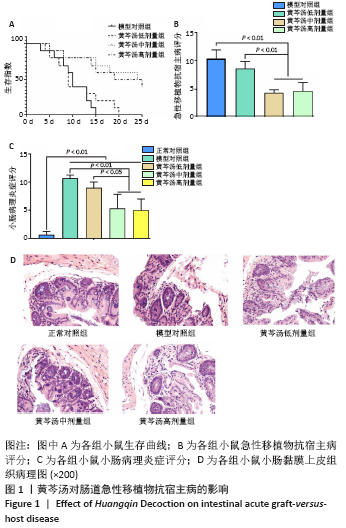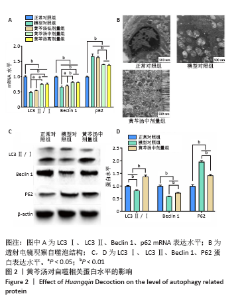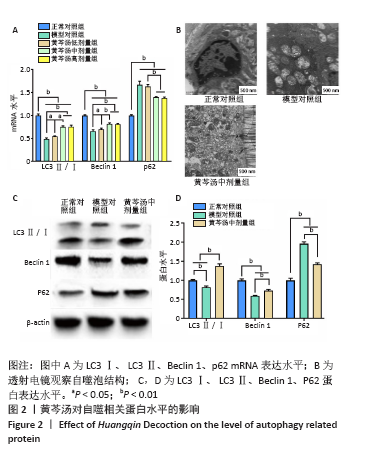[1] LIU A, MEYER E, JOHNSTON L, et al. Prevalence of graft versus host disease and cytomegalovirus infection in patients post-haematopoietic cell transplantation presenting with gastrointestinal symptoms. Aliment Pharmacol Ther. 2013;38(8):955-966.
[2] LIN Y, WANG B, SHAN W, et al. mTOR inhibitor rapamycin induce polymorphonuclear myeloid-derived suppressor cells mobilization and function in protecting against acute graft-versus-host disease after bone marrow transplantation. Clin Immunol. 2018;187:122-131.
[3] ZOU Y, LI WY, WAN Z, et al. Huangqin-Tang Ameliorates TNBS-Induced Colitis by Regulating Effector and Regulatory CD4(+) T Cells. Biomed Res Int. 2015;2015:102021.
[4] 王康,缪志伟,董筠,等.基于STAT3/NF-kB/IL-6通路研究加味黄芩汤治疗溃疡性结肠炎的作用机制[J].南方医科大学学报,2020, 40(2):196-202.
[5] 马旭冉,王彦礼,邹迪新,等.黄芩汤调控Nrf2通路对溃疡性结肠炎大鼠氧化应激作用的影响[J].药学学报,2019,54(4):653-659.
[6] AMARNATH S, FLOMERFELT FA, COSTANZO CM, et al. Rapamycin generates anti-apoptotic human Th1/Tc1 cells via autophagy for induction of xenogeneic GVHD. Autophagy. 2010;6(4):523-541.
[7] 钟萍,崔兴.黄芩苷调控自噬保护肠黏膜屏障干预肠道急性移植物抗宿主病[J].中国组织工程研究,2020,24(25):4028-4032.
[8] 陈慧瑶,张伟,方芳,等.肠三叶因子通过自噬在急性移植物抗宿主病中发挥保护作用[J].温州医科大学学报,2017,47(7):480-484.
[9] LE TEXIER L, LINEBURG KE, MACDONALD KP. Harnessing bone marrow resident regulatory T cells to improve allogeneic stem cell transplant outcomes. Int J Hematol. 2017;105(2):153-161.
[10] COOKE KR, KOBZIK L, MARTIN TR, et al. An experimental model of idiopathic pneumonia syndrome after bone marrow transplantation: I. The roles of minor H antigens and endotoxin. Blood. 1996;88(8): 3230-3239.
[11] KAWAKAMI K, MINAMI N, MATSUURA M, et al. Osteopontin attenuates acute gastrointestinal graft-versus-host disease by preventing apoptosis of intestinal epithelial cells. Biochem Biophys Res Commun. 2017; 485(2):468-475.
[12] SATO A, NISHIDA C, SATO-KUSUBATA K, et al. Inhibition of plasmin attenuates murine acute graft-versus-host disease mortality by suppressing the matrix metalloproteinase-9-dependent inflammatory cytokine storm and effector cell trafficking. Leukemia. 2015;29(1): 145-156.
[13] BIAGI E, ZAMA D, RAMPELLI S, et al. Early gut microbiota signature of aGvHD in children given allogeneic hematopoietic cell transplantation for hematological disorders. BMC Med Genomics. 2019;12(1):49.
[14] VAN MONTFRANS J, SCHULZ L, VERSLUYS B, et al. Viral PCR positivity in stool before allogeneic hematopoietic cell transplantation is strongly associated with acute intestinal graft-versus-host disease. Biol Blood Marrow Transplant. 2015;21(4):772-774.
[15] 首汉蓉,唐建,黄泽林,等.黄芩汤加减联合补脾益肠丸对溃疡性结肠炎患者Toll样受体4/髓样分化因子88信号通路的影响[J].陕西中医,2020,41(6):750-753.
[16] BUHNER S, BUNING C, GENSCHEL J, et al. Genetic basis for increased intestinal permeability in families with Crohn’s disease: role of CARD15 3020insC mutation? Gut. 2006;55(3):342-347.
[17] TOUBAI T, ROSSI C, ORAVECZ-WILSON K, et al. IAPs protect host target tissues from graft-versus-host disease in mice. Blood Adv. 2017;1(19): 1517-1532.
[18] BÖTTCHER M, HOFMANN AD, BRUNS H, et al. Mesenchymal Stromal Cells Disrupt mTOR-Signaling and Aerobic Glycolysis During T-Cell Activation. Stem Cells. 2016;34(2):516-521.
[19] NIGHOT PK, HU CA, MA TY. Autophagy enhances intestinal epithelial tight junction barrier function by targeting claudin-2 protein degradation. J Biol Chem. 2015;290(11):7234-7246.
[20] LE TEXIER L, LINEBURG KE, CAO B, et al. Autophagy-dependent regulatory T cells are critical for the control of graft-versus-host disease. JCI Insight. 2016;1(15):e86850.
[21] HUBBARD-LUCEY VM, SHONO Y, MAURER K, et al. Autophagy gene Atg16L1 prevents lethal T cell alloreactivity mediated by dendritic cells. Immunity. 2014;41(4):579-591.
[22] 方健松,马媛萍,刘畅,等.自噬介导肠黏膜屏障维持肠道稳态在炎症性肠病中的作用[J].实用医学杂志,2016,32(8):1367-1369.
[23] 王彬彬,武承凤,张方信.自噬在肠黏膜屏障功能作用机制的研究进展[J].基础医学与临床,2017,37(3):405-409.
[24] 邹颖,戴世学,迟宏罡,等.Th17/Treg平衡在湿热型结肠炎大鼠中的变化及黄芩汤的调节作用[J].中药药理与临床,2012,28(2):2-5.
[25] 黄继承,王浩,贡钰霞.黄芩汤合四逆散加减联合西药治疗急性肠炎(肝郁脾虚夹湿热)的临床观察[J].中国中医急症,2019,28(3): 513-515.
[26] 王倩,别玉龙,范文涛.加味黄芩汤对TNBS诱导的结肠炎大鼠肠道菌群结构及IL-6/STAT3信号通路的影响[J].陕西中医,2017,38(4): 528-530,539.
[27] 郑学宝,封艳玲,刘洪波,等.黄芩汤对湿热型溃疡性结肠炎大鼠CD4+T细胞及其共刺激分子的影响[J].中国实验方剂学杂志,2011, 17(1):169-172.
[28] ZHANG Q, SUN J, WANG Y, et al. Antimycobacterial and Anti-inflammatory Mechanisms of Baicalin via Induced Autophagy in Macrophages Infected with Mycobacterium tuberculosis. Front Microbiol. 2017;8:2142.
[29] PIDALA J, HAMADANI M, DAWSON P, et al. Randomized multicenter trial of sirolimus vs prednisone as initial therapy for standard-risk acute GVHD: the BMT CTN 1501 trial. Blood. 2020;135(2):97-107.
[30] HUANG L, JIANG Y, SUN Z, et al. Autophagy Strengthens Intestinal Mucosal Barrier by Attenuating Oxidative Stress in Severe Acute Pancreatitis. Dig Dis Sci. 2018;63(4):910-919.
[31] 吴东升,张彧,陈大光,等.自噬在炎症性肠病肠黏膜屏障损伤中的作用[J].胃肠病学,2018,23(12):755-758. |



